ANZEIGE

In patients with HR+/HER2– early breast cancer at high risk of recurrence*, the addition of abemaciclib (Verzenios®) to endocrine therapy (ET) showed sustained benefit.
Verzenios® Indication2
The monarchE study is specifically designed for patients with a high risk of recurrence. (N=5,637) Patients were randomized to receive standard ET (tamoxifen or aromatase inhibitor) alone or in combination with abemaciclib (150 mg BID for 2 years).2
Swiss approval was granted based on Cohort 1, which represents 91% of the ITT population**.
Cohort 1 inclusion criteria:3
- 1 to 3 positive axillary lymph nodes and tumor size ≥ 5 cm OR
- 1 to 3 positive axillary lymph nodes and histological tumor grade 3 OR
- ≥ 4 positive axillary lymph nodes
Verzenios® reduces the risk of recurrence* by one third.2
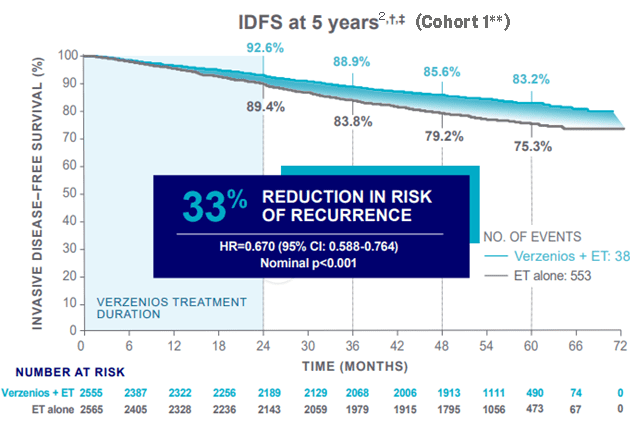
† Results depicted in the KM curve should not be interpreted beyond 60 months. A prespecified efficacy analysis from the original statistical plan was performed at a median follow-up of 4.5 years. IDFS analysis for this subpopulation was not powered nor alpha-controlled for testing statistical significance.4 ‡ Includes patients who were randomized but never treated. * Patients were considered to have high-risk disease based on the criteria used in the monarchE trial: ≥ 4 positive axillary lymph nodes or 1–3 positive axillary lymph nodes and tumors that were ≥ 5 cm, histological grade 3, or both. **The ITT population included Cohort 1 (n = 5‘120) and Cohort 2 (n = 517). Cohort 2 is not part of the swiss label. Inclusion criteria for Cohort 2 were 1–3 positive axillary lymph nodes and all of the following criteria: Tumor size < 5 m, histologic grade < 3, and centrally tested Ki-67 index ≥ 20 %. In Cohort 1 0.6 % of patients were male. Male population is excluded for the Swiss approval.
References: 1. Rastogi P et al. J Clin Oncol. 2024;42(9):987-93. 2. Johnston SRD et al. Lancet Oncol. 2023;24(1):77-90. 3. Verzenios. Summary of Product Characteristics. www.swissmedicinfo.ch 4. Hortobagyi GN et al. Ann Oncol. 2025;36(2):149-57.
MonarchE (Cohort 1 **) Subgroup Analysis: Enhanced Benefit in Younger Patients
A notable finding from the updated analysis is the enhanced benefit observed in younger patients (<40 years). This subgroup experienced numerically greater improvements in both IDFS and DRFS compared to patients over 40y. This may reflect the more aggressive tumor biology often seen in younger women, which appears to be more effectively countered by CDK4/6 inhibition.1
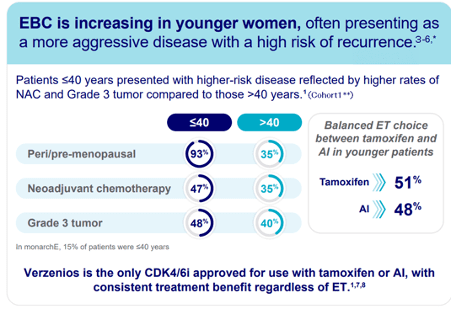
Consistent Benefit Across Age Groups (Cohort 1**)
Despite the amplified effect in younger patients, the benefit of abemaciclib was consistent across all age groups. This supports the broad applicability of the treatment and reinforces its role in the adjuvant setting for all patients meeting the monarchE high-risk criteria* .1
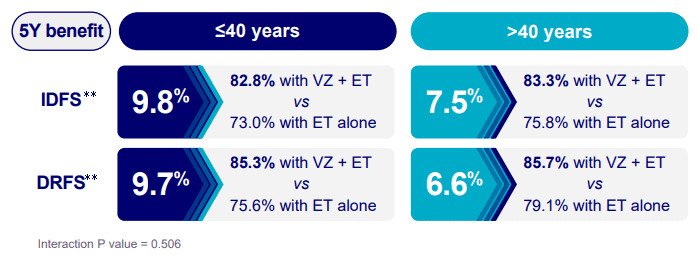
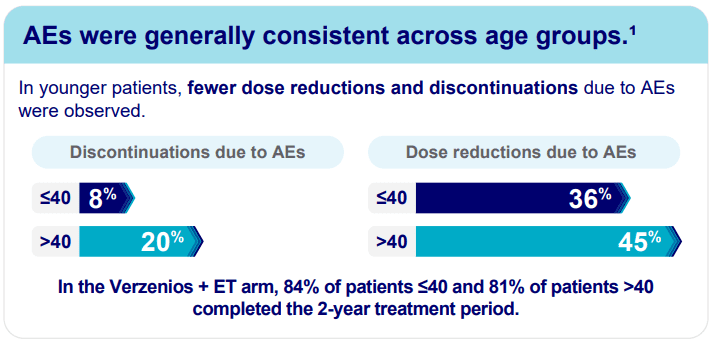
*High-risk EBC is defined as patients who had ≥4 positive nodes or 1-3 positive nodes and tumors that were ≥5 cm, histological Grade 3, or both (Cohort 1). † Protection here is defined as ”reduction in risk of recurrence over time.”2 ‡ Consistent treatment benefit of abemaciclib across age groups, with interaction p value = 0.506. **The ITT population included Cohort 1 (n = 5‘120) and Cohort 2 (n = 517). Cohort 2 is not part of the swiss label. Inclusion criteria for Cohort 2 were 1–3 positive axillary lymph nodes and all of the following criteria: Tumor size < 5 m, histologic grade < 3, and centrally tested Ki-67 index ≥ 20 %. In Cohort 1 0.6 % of patients were male. Male population is excluded for the Swiss approval.
References: 1. Harbeck N et al. Poster presented at European Society for Medical Oncology Congress, Munich, Germany, May 14-17, 2025. Poster 194P. 2. Rastogi P et al. J Clin Oncol. 2024;42(9):987-93. 3. Eliassen FM et al. BMC Cancer. 2023;23(1):625. 4. Barclay NL et al. Sci Rep. 2024;14(1):19069. 5. Xu S et al. JAMA Netw Open. 2024;7(1):e2353331. 6. Mesa-Eguiagaray I et al. Br J Cancer. 2020;123(5):852–59. 7. Verzenios. Summary of Product Characteristics. www.swissmedicinfo.ch 8. Kisqali. Summary of Product Characteristics.
Treatment Adherence and Dose Adjustments
A significant proportion of patients required dose reductions during the 2-year treatment period. Importantly, efficacy was maintained even in those who received reduced doses, highlighting the flexibility of the regimen and its tolerability in real-world settings (Cohort1**).5
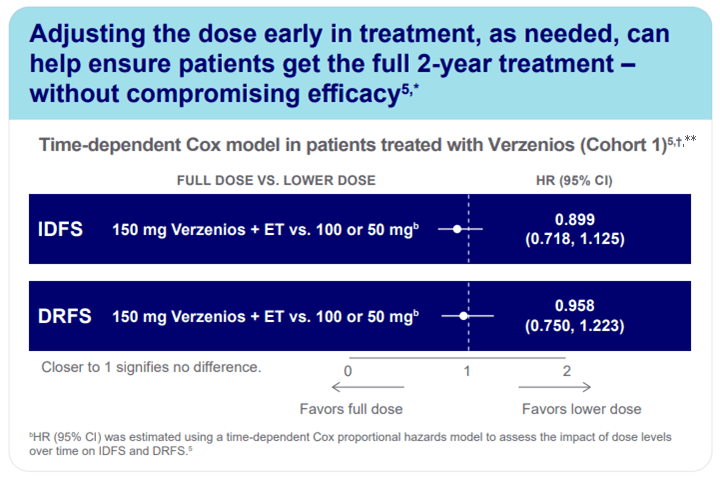
*44% of patients received a dose reduction to help them remain on treatment.2,5 † Cohort 1 included patients who had ≥4 positive nodes or 1-3 positive nodes and tumors that were ≥5 cm, histological Grade 3, or both.5
References: 1. Johnston SRD et al. Lancet Oncol. 2023;24(1):77-90. 2. Verzenios Summary of Product Characteristics. www.swissmedicinfo.ch 3. Rugo HS et al. Ann Oncol. 2022;33(6):616-27. 4. Johnston SRD et al. J Clin Oncol. 2020;38(34):3987-98. 5. Goetz MP et al. NPJ Breast Cancer. 2024;10(1):34.
Our Events
Nurse Webinar – Throwback to 19th June 2025
On May 19, 2025, our Nurse Webinar took place, where the role of nursing professionals in strengthening trust and therapy adherence among patients undergoing breast cancer treatment was discussed. The Webinar was held in German.
The webinar offered practical insights into:
• Effective collaboration and nurse-led consultations
• Maintaining long-term adherence and motivation
• Management of side effects from CDK4/6 inhibitor therapies
If you were unable to attend or would like to revisit the content, feel free to watch the various recordings – simply click on the links below.
Fireside Chat – Throwback to 10th July 2025
On July 10, our Fireside Chat took place on the topic “From Diagnosis to Decision: Expert Discussions on Adjuvant CDK4/6i Therapy in High-Risk Breast Cancer.”
Experts discussed current insights and practical experiences regarding the identification of high-risk patients who are most likely to benefit from adjuvant CDK4/6 inhibitors
If you were unable to attend or would like to watch the content again, feel free to view the video recordings – simply click the link below.
Abbreviations: AE=adverse event; AI=aromatase inhibitor; CDK4/6i=cyclin-dependent kinase 4/6 inhibitor; CI=confidence interval; DRFS=distant relapse-free survival; EBC=early breast cancer; EMA=European Medicines Agency; ET=endocrine therapy; HER2−=human epidermal growth factor receptor 2-negative; HR+=hormone receptor-positive; HR=hazard ratio; IDFS=invasive disease-free survival; KM=Kalpan-Meier; QoL=quality of life.
Verzenios® (Abemaciclib) Filmtabletten
I: Befristet zugelassene Indikation: Verzenios in Kombination mit endokriner Therapie (ET) ist angezeigt zur adjuvanten Therapie von erwachsenen Patientinnen mit Hormonrezeptor (HR)-positivem, humanem epidermalem Wachstumsfaktor-Rezeptor-2 (HER2)-negativem, Lymphknoten-positivem Brustkrebs im frühen Stadium mit hohem Rückfallrisiko aufgrund von Lymphknotenstatus, Primärtumorgrösse und Tumorgrad. Bei prä- oder perimenopausalen Frauen soll die ET mit einem Aromatasehemmer mit einem LHRH-Agonisten kombiniert werden. Nicht befristet zugelassene Indikation: Behandlung von postmenopausalen Frauen mit HR-positivem, HER2-negativem, lokal fortgeschrittenem oder metastasiertem Brustkrebs in Kombination mit einem Aromatasehemmer als initiale ET oder in Kombination mit Fulvestrant bei Frauen mit vorangegangener ET. Als Monotherapie nach Progression nach ET und einem oder zwei Chemotherapie-Regimen bei metastasierter Erkrankung, wenn eine Chemotherapie nicht geeignet ist. Bei prä- oder perimenopausalen Frauen in Kombination mit einem LHRH-Agonisten. D: Die empfohlene Dosis beträgt 150 mg zweimal täglich bei Anwendung in Kombination mit ET und 200 mg zweimal täglich als Einzelwirkstoff. KI: Überempfindlichkeit. W/V: Für Patientinnen, die zuvor keine (neo-) adjuvante Chemotherapie erhalten haben, sind die vorhandenen Daten begrenzt, da nur 2% der Patientinnen in der monarchE-Studie zu dieser Gruppe gehörten. Zum Zeitpunkt der befristeten Zulassung war kein statistisch signifikanter Nutzen einer adjuvanten Therapie mit Abemaciclib auf das Gesamtüberleben nachweisbar. Der Einfluss auf das Überleben im Vergleich zu einer späteren Behandlung im Rezidiv oder einer späteren Therapie in der fortgeschrittenen Erkrankung ist nicht untersucht. Neutropenie, Infektionen, interstitielle Lungenerkrankung (ILD)/Pneumonitis, Diarrhoe, erhöhte Aminotransferasen, venöse Thromboembolien und arterielle thromboembolische Ereignisse sind aufgetreten. Enthält Lactose. Verzenios kann die Fahrtüchtigkeit und die Fähigkeit, Maschinen zu bedienen, beeinträchtigen. IA: In vitro führten Abemaciclib und seine zirkulierenden aktiven Metabolite zur Down-Regulation der mRNA von CYPs, einschliesslich CYP1A2, CYP2B6, CYP2C8, CYP2C9, CYP2D6 und CYP3A4. In einer klinischen Arzneimittel-Wechselwirkungsstudie bei Frauen mit Krebserkrankung führte die Mehrfachgabe von Abemaciclib nicht zu klinisch relevanten Veränderungen der Pharmakokinetik von CYP1A2 (Koffein), CYP2C9 (S-Warfarin), CYP2D6 (Dextromethorphan) und CYP3A4-Substraten (Midazolam). Die klinischen Auswirkungen der Down-Regulation von CYP2C8 und CYP2B6 sind nicht bekannt. Abemaciclib ist ein Substrat von CYP3A4, Veränderungen der Pharmakokinetik von Abemaciclib in Abhängigkeit der Zeit als Folge einer Autoinhibition des eigenen Metabolismus wurden nicht beobachtet. Wenn starke CYP3A4-Inhibitoren wie beispielsweise Clarithromycin, Itraconazol, Ketoconazol, Lopinavir/Ritonavir, Posaconazol oder Voriconazol gleichzeitig verabreicht werden müssen, ist die Dosis von Abemaciclib zu reduzieren. Vorsicht und ein Monitoring der Toxizität wird während der gleichzeitigen Behandlung mit sensitiven Substraten von P-gp oder BCRP, die eine geringe therapeutische Breite haben, wie z. B. Digoxin und Dabigatran empfohlen. Empfindliche Substrate von P-gp oder BCRP, die keine enge therapeutische Breite haben, so wie Pitavastatin, Pravastatin und Rosuvastatin, können mit Vorsicht eingesetzt werden. Abemaciclib und seine aktiven Hauptmetabolite hemmen die renalen Transporter OCT2, MATE1 und MATE2-K bei Konzentrationen, die mit den zugelassenen empfohlenen Dosierungen erreicht werden können. Sch/S: Es liegen keine Daten zur Anwendung von Abemaciclib bei schwangeren Frauen vor. Tierstudien haben eine Reproduktionstoxizität gezeigt. Daher darf Verzenios während der Schwangerschaft und bei gebärfähigen Frauen ohne Anwendung eines Verhütungsmittels nicht angewendet werden, es sei denn, dies ist absolut erforderlich. Falls Verzenios während der Schwangerschaft verwendet wird oder wenn eine Patientin während der Behandlung schwanger wird, sollte die Patientin auf das potentielle Risiko für den Fötus hingewiesen werden. Es ist nicht bekannt, ob Abemaciclib in die Muttermilch übergeht. Ein Risiko für das Neugeborene oder Kleinkind kann nicht ausgeschlossen werden. Frauen dürfen während der Behandlung mit Abemaciclib und bis mindestens 3 Wochen nach der letzten Anwendung von Abemaciclib nicht stillen. UAW: Sehr häufig: Infektionen, Neutropenie, Anämie, Leukopenie, Thrombozytopenie, verminderter Appetit, Dysgeusie, Schwindel, Diarrhoe, Übelkeit, abdominelle Schmerzen, Erbrechen, Stomatitis, Alopezie, Ausschlag, Pruritus, Fatigue, Pyrexie, ASAT/ALAT erhöht. Häufig: Vermehrter Tränenfluss, venöse Thromboembolie, Lymphopenie, ILD/Pneumonitis, Mundtrockenheit, trockene Haut, Muskelschwäche. P: 50 mg, 100 mg, 150 mg, 200 mg: 28 und 56 Filmtabletten. Abgabekategorie A. Weitere Informationen finden Sie unter www.swissmedicinfo.ch. Eli Lilly (Suisse) SA, ch. des Coquelicots 16, CP 580, 1214 Vernier (GE). V12-2023
Dieser Inhalt ist werbewirksam und wurde von Eli Lilly (Suisse) SA entwickelt und gesponsert.
Er ist nur für medizinisches Fachpersonal bestimmt. Bitte kopieren oder übertragen Sie ihn nicht.
Copyright© 2025. Alle Rechte vorbehalten.
Eli Lilly (Suisse) SA, Chemin des Coquelicots 16,1214 Vernier, Schweiz.

PP-AL-CH-0757/09.2025


